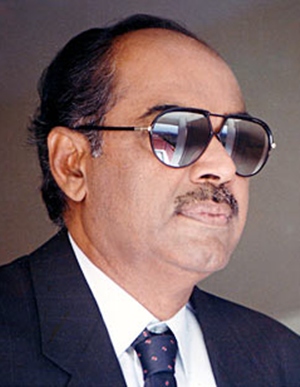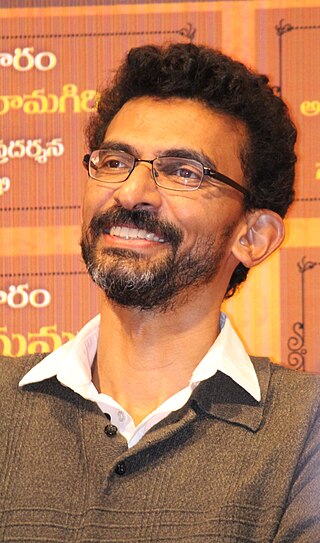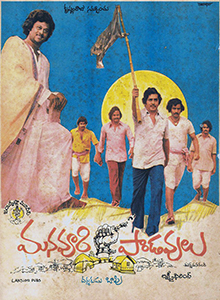Related Research Articles

Sowmya Sathyanarayana, better known by her stage name Soundarya, was an Indian actress known for her works primarily in Telugu cinema. She was regarded as one of the greatest actresses in the history of Telugu cinema. She also acted in a few Kannada, Tamil, Hindi and Malayalam films. She has received three Nandi Awards, two Karnataka State Film Awards and six Filmfare Awards South. In 2002, she received the National Film Award for Best Feature Film as a producer for the Kannada film Dweepa.

Daggubati Ramanaidu was an Indian film producer known for his work in Telugu cinema. He founded Suresh Productions in 1964 which became of one of the largest film production companies in India. He was one of the most influential movie Moguls in Indian cinema. He was placed in the Guinness Book of World Records for the most films produced by an individual, with more than 150 films in all official Indian languages. He also served as a Member of Parliament for the Bapatla constituency in Andhra Pradesh in the 13th Lok Sabha from 1999 to 2004.

Ninne Pelladata is a 1996 Indian Telugu-language romantic family drama film directed by Krishna Vamsi and produced by Nagarjuna under the Annapurna Studios banner. The film stars Nagarjuna and Tabu, with music composed by Sandeep Chowta. The film received the National Film Award for Best Feature Film in Telugu for that year and was a major success at the box office. It was also the highest grossing Telugu film at the time of released and surpassed the previous industry hit "pedarayudu" life time collections. It was remade in Kannada as Preethsod Thappa.

Annamayya is a 1997 Indian Telugu-language hagiographical film directed by K. Raghavendra Rao and produced by V. Doraswamy Raju under the VMC Productions banner. The film portrays the life of the 15th century composer Annamacharya, played by Nagarjuna Akkineni who features alongside an ensemble cast including Mohan Babu, Suman, Ramya Krishna, Bhanupriya, Roja, and Kasthuri. The film has score and soundtrack composed by M. M. Keeravani. Upon release, the film received positive reviews and won eight Nandi Awards, three Filmfare Awards and two National Film Awards. The film was featured in the Indian panorama mainstream section at the 29th IFFI.

Akkineni Nagarjuna Rao, known mononymously as Nagarjuna, is an Indian actor, film producer and entrepreneur. Nagarjuna has acted predominantly in Telugu cinema, along with a few Hindi and Tamil films. He received two National Film Awards namely, for Ninne Pelladata (1996), which he produced won the Best Feature Film in Telugu and a Special Mention as actor for Annamayya (1997), ten state Nandi Awards, and three Filmfare Awards South.

Ramya Krishnan, also credited as Ramya Krishna, is an Indian actress. She has appeared in five languages: Telugu, Tamil, Kannada, Malayalam, and Hindi. Ramya has won four Filmfare Awards, three Nandi Awards, and a Tamil Nadu State Film Award Special Prize.

Prakash Raj is an Indian actor, film director, producer, television presenter, and politician. Known for his works in Telugu, Tamil, Kannada, Malayalam, English, and Hindi-language films, he is the recipient of several accolades, including five National Film Awards, eight Nandi Awards, eight Tamil Nadu State Film Awards, six Filmfare Awards South, four SIIMA Awards, three CineMAA Awards, and three Vijay Awards. Apart from his native languages Tulu and Kannada, Raj's fluency in Telugu, Tamil, Hindi, English, and Marathi has placed him among the most sought after actors in Indian cinema.

Style is a 2006 Indian Telugu-language dance film written and directed by Raghava Lawrence. Produced by Larsco entertainments, the film stars Prabhu Deva, Raghava Lawrence, Raja, Kamalinee Mukherjee and Charmme Kaur in important roles with Chiranjeevi in cameo appearances. The film marks Lawrence's second directorial venture after Mass. The soundtrack was composed by Mani Sharma.
Raghava Lawrence is an Indian actor, choreographer, film director, composer, playback singer, lyricist, film producer and philanthropist known for his works primarily in Tamil cinema. After making his debut as a dance choreographer in 1993, he began looking for acting opportunities. He began his career as an actor in 1998, in a Telugu film. He adopted the name "Raghava" in 2001, and worked for many prominent actors and directors in Tamil cinema throughout his career. He got his breakthrough with Telugu film Style and then Muni. Lawrence is also known for his intricate hip-hop and westernised dance moves and has won four Filmfare Awards, three Nandi Awards and two Tamil Nadu State Film Award for best choreography.

Veeramachaneni Jagapathi Chowdary, professionally known as Jagapathi Babu, is an Indian actor known for his works in Telugu cinema. He has also appeared in Tamil, Malayalam, Hindi and Kannada films. Babu has appeared in 170 feature films, and has received four Filmfare Awards and seven state Nandi Awards.

Hello Brother is a 1994 Indian Telugu-language action comedy film, produced by K. L. Narayana and directed by E. V. V. Satyanarayana. It stars Nagarjuna, Ramya Krishna and Soundarya, with music composed by Raj–Koti. The film is loosely based on the Hong Kong action comedy Twin Dragons (1992). In turn, Hello Brother spawned several of its own remakes, twice in Hindi as Judwaa (1997) and its reboot Judwaa 2 (2017), in Kannada as Cheluva (1997) and in Bengali as Bhaijaan Elo Re. The film was the highest grossing Telugu movie of 1994.

Gunasekar is an Indian film director and screenwriter known for his works in Telugu cinema. He has directed films in action, romance, mythological, and historical drama genres. He has won a National Film Award, multiple Nandi Awards, and a Filmfare Award South.

Sekhar Kammula is an Indian film director, screenwriter and producer who works in Telugu cinema. He has garnered two Filmfare Awards South, and six state Nandi Awards for his directional works. Sekhar Kammula was among the director's delegation to represent South Indian Cinema at the 2011 Cannes Film Festival.

Manavoori Pandavulu is a 1978 Indian Telugu-language film directed by Bapu and written by Mullapudi Venkata Ramana, dealing with the struggle against the feudal system in their own unique way. The film is remake of Kannada film Paduvaaralli Pandavaru (1978) directed by Puttanna Kanagal. In 1980, he also remade it in Hindi as Hum Paanch starring Mithun Chakraborty.

Suresh Krissna is an Indian film director who has directed Tamil, Telugu, Malayalam, Kannada, Hindi Language films. His first independent film as a director was Sathya (1988), with Kamal Haasan. He is well known for having directed Rajinikanth in four films which include, Annamalai (1992), Veera (1994), Baashha (1995) and Baba (2002).

Adurthi Subba Rao was an Indian film director, screenwriter, producer, and editor, primarily recognized for his contributions to Telugu cinema, with a few works in Hindi and Tamil cinema. In an era dominated by mythological and fantasy genres, Subba Rao was a trailblazer in introducing social dramas and contemporary narratives to Telugu cinema. Over his career, he won seven National Film Awards and three Nandi Awards.
Aamani is an Indian actress who has predominantly appeared in Telugu films in addition to a few Tamil and Kannada films. She made her debut in a lead role opposite Naresh in the Telugu film Jamba Lakidi Pamba (1992), directed by E. V. V. Satyanarayana. The film turned out to be a blockbuster. She has received two state Nandi Awards and one Filmfare Awards South.

Ghanta Naveen Babu, known professionally by his screen name Nani, is an Indian actor and film producer who predominantly works in Telugu cinema. Nani is a recipient of several awards including two Nandi Awards, three Filmfare Awards South and four South Indian International Movie Awards.

Sankeertana is a 1987 Telugu-language film, produced by M. Gangaiah under the Konark Movie Creations banner and directed by Geetha Krishna. It stars Nagarjuna and Ramya Krishna, with music composed by Ilaiyaraaja. It was released on 20 March 1987. The film was dubbed in Tamil as En Paadal Unakkaga. The film was partially adapted in Tamil as Deiva Vaakku.
References
- 1 2 "నంది అవార్డు విజేతల పరంపర (1964–2008)" [A series of Nandi Award Winners (1964–2008)](PDF) (in Telugu). Information & Public Relations of Andhra Pradesh. Archived (PDF) from the original on 23 February 2015. Retrieved 21 August 2020.
- ↑ "Interview Template 2". Sify . Archived from the original on 31 March 2014. Retrieved 9 August 2022.
- ↑ "Tamil Cinema News | Tamil Movie Reviews | Tamil Movie Trailers - IndiaGlitz Tamil". Archived from the original on 14 April 2009.
- ↑ "A 65-hour docu-film on India". The Times of India . Archived from the original on 6 February 2014. Retrieved 2 February 2022.
- ↑ "Geetha Krishna's docu-feature". The Hindu. 18 May 2013.